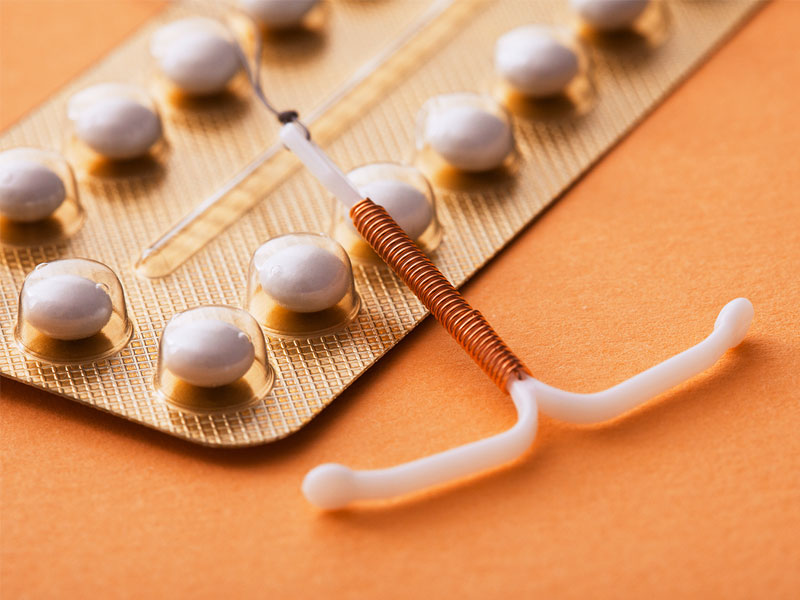
Choosing the right contraception can feel overwhelming when contraception does so much more than prevent pregnancy for those with a variety of gynecological conditions. You want birth control that is compatible with your body and individual lifestyle. Since every woman is unique, there is no one-size-fits-all birth control solution. Even among birth control and IUDs, there are several different options. If you don’t choose your birth control carefully, you’re more likely to experience unpleasant side effects or irritate pre-existing conditions. Tidewater Physicians for Women will help you find the right birth control for your needs.
What’s the Difference Between the Pill and an IUD?
The pill is taken by mouth daily while IUDs are inserted into the uterus once every several years.
Oral contraceptives, commonly called birth control pills, are used more than any other form of birth control. Birth control pills are taken once a day by mouth and release hormones that prevent pregnancy, regulate your menstrual period, reduce the risk of certain types of reproductive cancers, treat endometriosis, and improve acne symptoms for many.
Alternatively, an intrauterine device (IUD) is inserted into your uterus during an office visit by your doctor and prevents sperm from entering the uterus and fertilizing an egg. IUDs last several years.
Both the pill and the IUD are highly effective in preventing pregnancy for both short and extended periods of time. Each offers specific advantages and disadvantages depending on your lifestyle, needs, and health. However, neither prevents you from contracting sexually transmitted infections (STIs).
What are the Types of Birth Control Pills?

There are two different kinds of pills: combination pills and mini pills. Combination pills contain two hormones, progestin and estrogen, while mini pills contain just progestin (and a smaller dose of it).
When we talk about the effectiveness of birth control, we look at perfect use and typical use. Perfect use is defined as taking the pill exactly as prescribed, while typical use is taking it the way the average woman takes it. She may not take it at the exact same time every day, or she might forget to take it from time to time, for example. The pill is over 99% effective with perfect use and 91% effective with typical use.
Combination Pills
Combination pills, which contain the hormones estrogen and progesterone, prevent pregnancy in three ways:
- They change the cervical mucus to help prevent sperm from reaching the uterus.
- They cause changes in the lining of the uterus to make it uninhabitable for a fertilized egg.
- They prevent your ovaries from releasing an egg to stop fertilization from occurring.
Combination pills are often used to help reduce period pain, improve acne, regulate your menstrual cycle, make your period shorter and lighter, and reduce the risk of colorectal, endometrial, and ovarian cancers. They are also used to reduce the production of androgens in patients with polycystic ovary syndrome (PCOS). Common side effects of combination pills include breast tenderness, bloating, nausea, high blood pressure, headaches, and breakthrough spotting or bleeding.
Progestin-Only Pills
Progestin-only pills are often called mini-pills because they contain only progestin and a smaller dose of progestin than combination pills.
Not everyone is a good candidate for combination pills, and mini pills step up to the plate in many of those cases. Progestin-only pills can prevent pregnancy and lower your risk of cancer and are safe to take if you’re breastfeeding, have high blood pressure, migraines, or heart disease, or are sensitive to estrogen. However, it’s important to note that taking the mini pill at the same time every day is crucial to preventing pregnancy, so those who take this route should establish a good morning or evening routine that involves taking birth control at the same time every day.
What are the Different Kinds of IUDs?
IUD stands for intrauterine device. There are two primary kinds of IUDs available: copper IUDs (ParaGard) and hormonal IUDs (Mirena, Kyleena, etc.).
Hormonal IUDs

Hormonal IUDs are made of flexible plastic and prevents pregnancy in several ways:
- They change your ovulation pattern.
- They thin your endometrium to prevent implantation.
- They thicken cervical mucus to make passage difficult for sperm.
While the amount of hormone in each brand of hormonal IUD can vary, they all contain progestin only.
Most people notice lighter periods and cramping after getting a hormonal IUD, and as many as 1 in 5 stop menstruating altogether. Women with IUDs begin menstruating again when the IUD is removed.
Hormonal IUDs like Mirena offer several benefits:
- There is no pill to take every day, so there is no difference between perfect use and typical use; once you have the IUD inserted, you have 99% protection against pregnancy.
- Hormonal IUDs can be removed any time you choose, with help from your doctor.
- They can be effective in treating PCOS and endometriosis symptoms.
- They can be used as emergency contraceptive when inserted within 5 days of unprotected sex.
- They remain effective for 7-12 years depending on the brand of hormonal IUD used.
The side effects of hormonal IUDs include pain and cramping during and immediately following insertion, irregular periods, and spotting between your regular periods.
Copper IUDs
The only copper IUD on the market is ParaGard. For women who have experienced side effects from hormonal birth control in the past, copper IUDs can be a suitable substitute.
Just like hormonal IUDs, copper IUDs are inserted into the uterus by a physician during an office visit. They last up to twelve years and do not require maintenance during that time aside from regular annual physicals. The motility and viability of sperm is significantly reduced in the presence of copper, so copper IUDs work by inhibiting a sperm cell and preventing it from reaching an egg. Copper IUDs do not changing your endometrium, ovulation schedule, or cervical mucus.
Like hormonal IUDs, copper IUDs are highly effective (99%) forms of emergency contraceptive when inserted within five days of unprotected sex.
Some of the reasons women choose ParaGard include the convenience (no pill to take every day), the lack of a hormonal component for those with sensitivities or side effects, and the complete reversibility when ready to start a family.
Potential side effects of copper IUDs include more cramping and heavier periods, which often resolve after 3-6 months.
Which is a Better Contraception Method: IUD or the Pill?
When it comes to an IUD vs. the pill, no method of birth control is superior or inferior. The right option depends on your medical history, treatment goals, and more. The only way to find the right birth control for your unique body and needs is to talk to a doctor and make the decision together. Even then, you may need to try more than one form of contraception before finding the one that works best for you.
Advantages of the IUD
IUDs are easier to use than the pill. You schedule an appointment with your women’s health doctor, and he or she inserts the device during an office visit. Depending on the brand and type of IUD you use, you won’t need it replaced for years. You do not have to remember to take a pill every day or worry that efficacy will decline because you forgot to take your pill (or took it later than usual).
Non-hormonal options (ParaGard) are available for those who are sensitive to hormones, who have experienced side effects, or who have contraindications that prevent them from using hormonal birth control. Because there is a non-hormonal option, nearly everyone is a candidate.
IUDs are long-acting. With some brands lasting up to 12 years, IUDs are a great option for women who do not want children soon or who do not want children at all.
Additionally, IUDs can help treat the symptoms of other gynecological conditions like polycystic ovary syndrome (PCOS) and endometriosis.
Finally, many of the side effects that come with oral contraceptives are much less common with IUDs. They do not increase your risk of developing blood clots like combination pills, making IUDs a much safer option for women over 35 and women who smoke.
Advantages of the Pill
The pill can be more effective for women who have uterine fibroids. Fibroids can change the landscape of the uterus, making IUDs less effective.
Birth control pills, whether combination or progestin-only, can reduce your risk of ectopic pregnancy.
Combination pills are helpful in preventing and treating acne, cysts in your ovaries, cysts in your breasts, infections in your reproductive system, iron deficiency, ovarian and endometrial cancer, and bone thinning.
Finally, birth control pills can make your periods shorter, lighter, and more predictable. Some brands give you the option to skip your period altogether.
Factors to Consider When Choosing Your Contraception Method

When it comes to your reproductive health, the decisions you make are personal and multiple factors will play a role. Your gynecologist or OB/GYN will help you make an informed decision, taking the following factors into consideration as you evaluate birth control options.
Your Lifestyle
Whether you feel like you can remember to take a pill at the same time every day will influence the decision. What does your daily routine look like? People who work rotating shifts or do not have a solid daily routine often have more difficulty remembering to take their birth control pill every day, around the same time, while those who in a structured schedule may be more successful.
Smoking also plays a role. Smoking and hormonal birth control both increase your risk of blood clots, so smoking typically makes you a stronger candidate for hormone-free birth control.
Your Medical History
Your healthcare provider will review your medical history in detail to determine whether you have any conditions that make one type of birth control more preferable for symptom management/treatment or less preferable due to risk or side effects. If you have been diagnosed with endometriosis, this will impact your birth control options.
It’s also important to take your period into consideration because most birth control methods have the potential to regulate your period, lighten your flow, reduce cramping, or skip your periods. If you are experiencing heavy periods, infrequent periods, or painful periods, let your doctor know so their medical advice can address birth control as an option for regulating your period and alleviating your symptoms.
Your Insurance Coverage
Your provider’s office can help you explore what kind of birth control methods are covered by your medical insurance. Even the most basic insurance plans typically cover generic birth control options, which provide the same protection as brand-name options, due to the provisions of the Affordable Care Act (ACA). Neither an IUD nor oral contraceptives are always cheaper; it just depends on your insurance plan, whether the option you’ve chosen is available in a generic form, and other factors.
Once you’ve evaluated potential birth control options that meet your needs with your OB/GYN, the billing office or your pharmacist can help you explore covered options and suitable substitutes. You might be surprised to find that you do not have to pay anything at all!
Clinics like Planned Parenthood offer sliding fee scales for patients who do not have insurance to ensure everyone has access to birth control that meets their family planning needs.
Keep in mind when making a decision that neither IUDs nor the pill protect against sexually transmitted infections, also called STIs (formerly called sexually transmitted diseases, or STDs). Using a condom or other barrier methods is the safest way to prevent sexually transmitted infections.
Discover the Best Options For You
If you’re ready to explore birth control options and find the solution that not only helps you prevent pregnancy with confidence but also helps you treat other gynecological symptoms, call Tidewater Physicians for Women at 757-461-6890 to schedule an appointment.

Written By Tidewater Physicians For Women


828 Healthy Way Unit 330
Virginia Beach, VA 23462
Fax: 757-467-0301
844 Kempsville Road #208
Norfolk, VA 23502
Fax: 757-461-0836
Appointments:
757-461-3890
Inquiries:
757-461-3890
Notice of Privacy Practices
Notice of Financial Policies

© Tidewater Physicians for Women